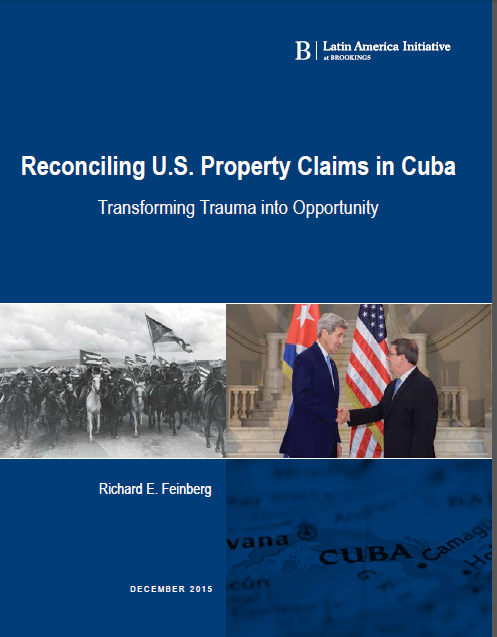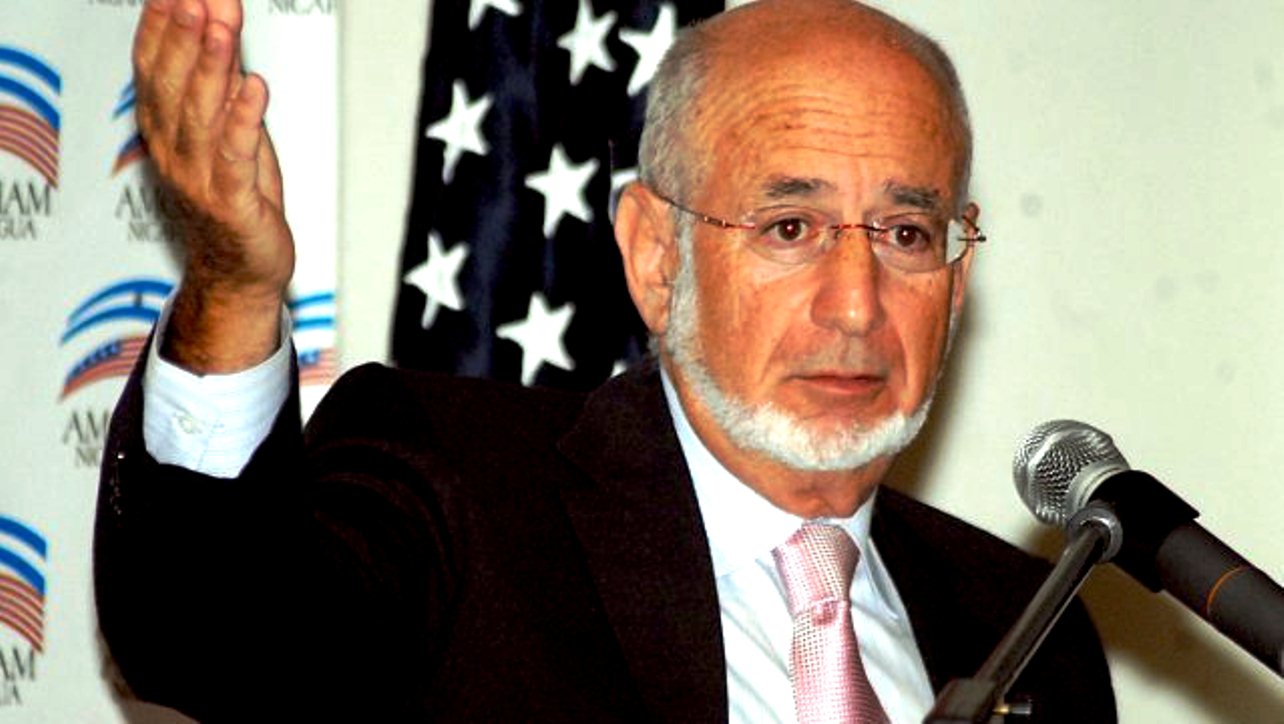Richard Feinberg, December 2015, Brookings Institute
Original Here: Reconciling U.S. Property Claims in Cuba: Transforming Trauma into Opportunity.”
 CONCLUSION: . A Grand Bargain?
CONCLUSION: . A Grand Bargain?
In their opening meetings, the U.S. and Cuba will present their conflicting claims. One possible outcome is protracted and contentious negotiations. But there is a much more promising alternative approach: to take advantage of the very size and complexity of the conflicting claims and to make their resolution the centerpiece of a grand bargain that would resolve some of the other remaining points of tension between the two nations, and embrace an ambitious, forward-looking development strategy for Cuba.
There are precedents for such a grand bargain, in such cases as the Soviet Union, Vietnam, and China. The Roosevelt-Litvinov agreements—negotiated in the White House directly between the U.S. president and Soviet foreign minister—laid the foundations for renewing diplomatic relations, and one might argue for the World War II alliance that defeated the axis powers. Similarly, the claims settlement with Vietnam was one piece of a much broader normalization process between the two once bitter adversaries—two nations that now label themselves strategic allies. Pointedly, at the August 14, 2015 flag-raising ceremony at the U.S. Embassy in Havana, Secretary of State John Kerry remarked:
“And last week, I was in Hanoi to mark the twentieth anniversary of normalization of relations between the United States and Vietnam. Think about that. A long and terrible war that inflicted indelible scars on body and mind, followed by two decades of mutual healing, followed by another two decades of diplomatic and commercial engagement. In this period, Vietnam evolved from a country torn apart by violence into a dynamic society with one of the world’s fastest growing economies.”
In recent U.S.-Cuban relations, there is also the precedent of the December 17, 2014 announcements, when the return of Alan Gross and a CIA asset for three Cuba spies was wrapped in the larger story of normalizing diplomatic relations, and on the U.S. side, the relaxing of certain travel and economic restrictions.
The two-tiered settlement strategy outlined above allows for U.S. firms to re-engage in Cuba. At the same time, some individual claimants and their families harbor deep affections for Cuba and would probably be willing to contribute to its future development. Cuba could consider special incentives to regain this legacy of the island’s past, and for interested claimants to match their awards with re-investments in new projects.
With the right incentives, Cuba could also attract the capital and talents of many of the two million Cuban-Americans resident in the United States. With their separate legal issues and emotional charges, and the vastness of their numbers, the property claims of Cuban-Americans will require their own treatment (more on this in a subsequent paper). But the settlement of U.S. property claims might include a general framework for the future consideration of issues of concern to Cuban-Americans – with the overarching goal being reconciliation of the diaspora with the homeland.
The settlement of U.S. claims could be wrapped in a package of economic opportunities for Cuba. Importantly, the United States could further relax its economic sanctions (amending or repealing Helms-Burton), providing more trade and investment opportunities – and the capacity for Cuba to earn the foreign exchange needed to service debt obligations. In turn, Cuba will have to accelerate and deepen its economic reforms, to offer a more attractive business environment for investors and exporters. Politically, the Cuban government could present a significant softening of the U.S. embargo as a victory, offsetting any concessions made in the claims negotiations. A comprehensive package might also be more attractive to the U.S. Congress; formal Congressional consent would enhance the measures’ legitimacy and durability and help to close off any court challenges, should some claimants be unsatisfied with the final settlement. It is time for Cuba to enter the international financial institutions and the United States should no longer stand in the way. The IFIs can play a vital role, in providing capital and connections to the global marketplace. The IMF and World Bank are also deep repository of knowledge on transitions from central planning to more market-driven economic systems.
The claims settlement agreement between the United States and Hungary contained an annex where it was agreed, inter alia, that the Hungarian Government intended to settle outstanding dollar bonds through direct talks with bondholders; and that the United States would seek authority from its legislature to accord Most-Favored Nation (MFN) treatment to Hungary, subject to separate negotiations.
75 In a grand bargain, the United States could offer to work with Cuba and other creditors to renegotiate Cuba’s outstanding official (Paris Club) and commercial (London Club) debts on terms that take into account Cuba’s capacity to pay.76 The U.S. government continues to carry on its books $36.3 million of Cuban obligations to the U.S. Export-Import Bank (Ex-Im Bank), which could be addressed within the Paris Club framework.77 The United States could also agree to reconsider remaining trade and investment restrictions.
At this stage, it would be too much to expect agreement on a detailed development strategy for Cuba. But a process could be put in place whereby Cuba would work with its many international partners, including the United States, to forge a twenty-first century development model that preserves the social gains of the revolution but that also raises labor productivity and living standards.
Under President Raúl Castro, Cuba has initiated economic reform and the international community can accompany it by adding its expertise and resources. It would not be too much for the claims ettlement talks, if they agree on a two-tiered strategy, to include a discussion of the business climate, and what additional steps Cuba needs to take to attract badly needed foreign investment. As strict socialist property relations are gradually replaced by a more hybrid economic system, Cuba will need to design and implement new property regimes that promote individual initiative but that also encompass land-use, housing, natural resources and other regulatory oversight protective of the public interest and consistent with sustainable and equitable growth.
The strategic goals in a massive claims resolution process must be political: to heal the deep wounds of past conflicts, to lay foundations for peaceful coexistence and the non-violent resolution of disputes, to avoid jeopardizing fiscal balances and crippling debt burdens, to build investor confidence and international reputation, and to help render the Cuban economy more open and competitive. These vital goals will not always be fully convergent with the more traditional, legal objective focused narrowly on the rights of property claimants. In designing and implementing solutions, as claimants bang on doors and demand attention, policy makers should not lose sight of their overriding purposes. In the interests of both Cuba and the United States, the twentieth-century trauma of massive property seizures should be transformed into a twenty-first century economic development opportunity.
Richard Feinberg is a nonresident senior fellow with the Latin America Initiative at the Brookings Institution. He is a professor of international political economy at the School of Global Policy and Strategy, University of California, San Diego. His four decades of engagement with inter-American relations spans government service (in the White House, Department of State, and U.S. Treasury), numerous Washington, D.C.-based public policy institutes, the Peace Corps (Chile), and now in academia. He is also the book reviewer for the Western Hemisphere section of Foreign Affairs magazine.


